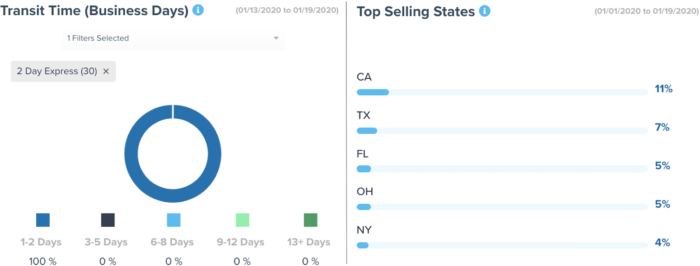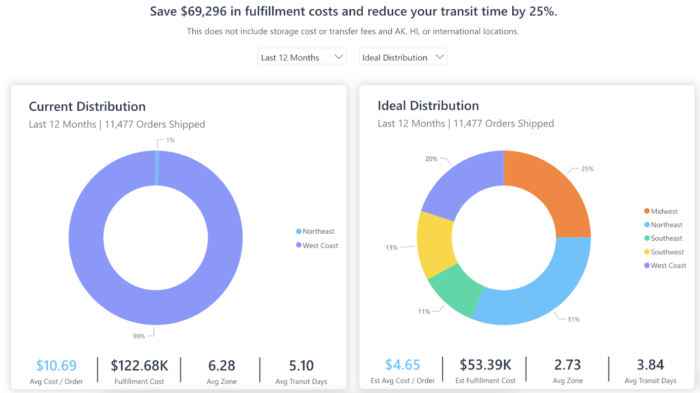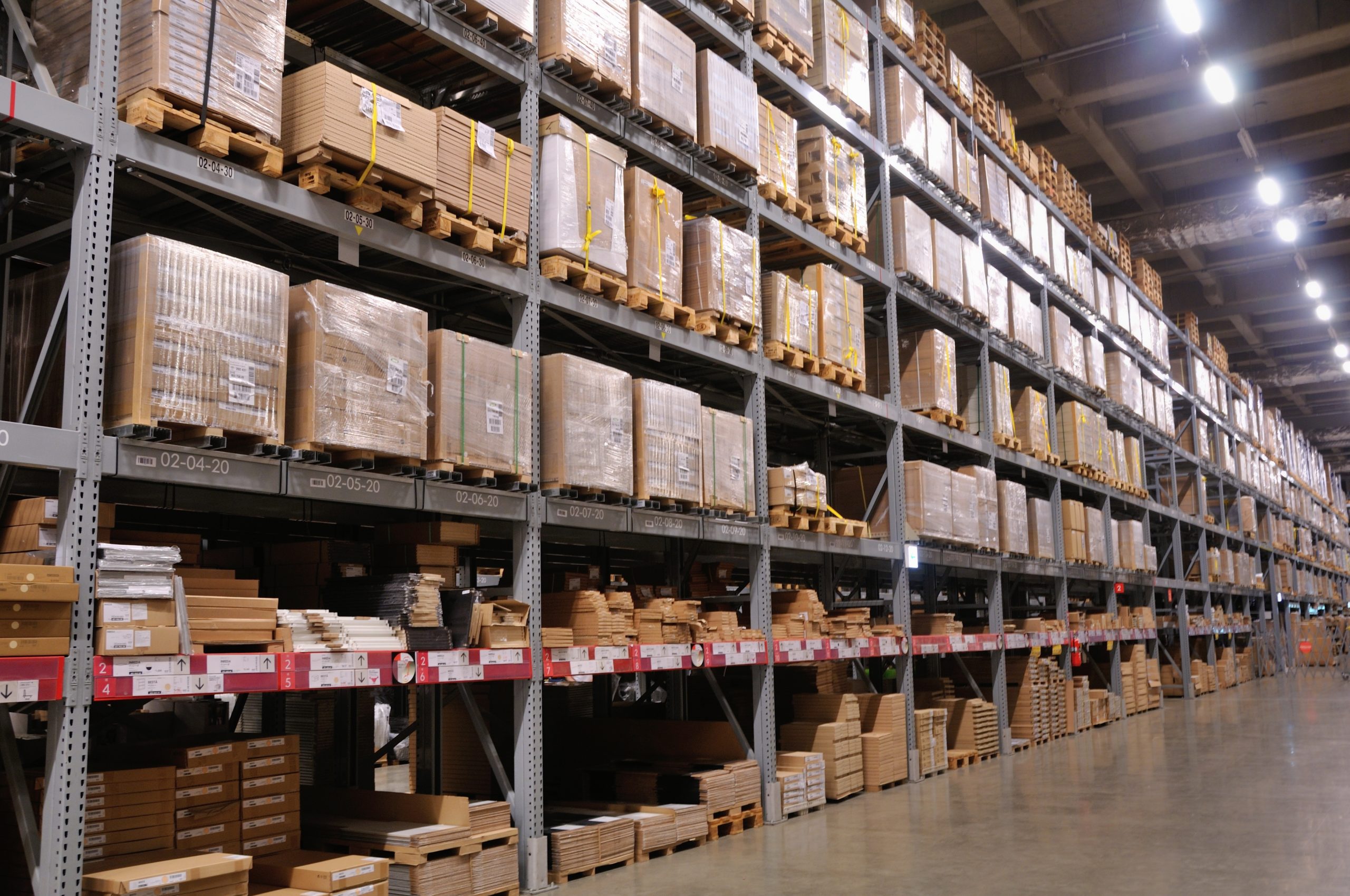Table of Contents
** Minutes
What are the benefits of using cloud shipping?
What to look for in a cloud shipping company
Top cloud shipping companies to keep your eye on in 2021
To say that ecommerce shippingis challenging is an understatement.
To optimize for affordable and fast shipping, business owners are required to shuffle through all the carriers, services, rates, and rules and regulations:
- USPS, FedEx, DHL, or UPS?
- Flat-rate shipping, expedited, or ground?
- 2-day shipping, same-day delivery, or others?
Shipping has always been one of the biggest pain points online brands face.
And with experts saying shipping problems will continue into 2022, businesses will need to invest the time and money into reevaluating their shipping strategy to thrive.
Fortunately, cloud-based ecommerce shipping software can help to alleviate some of the headaches.
This articles explores the benefits of cloud shipping and what to look to look for in a cloud shipping solution. Additionally, get a deeper dive into the leading cloud shipping companies.
What is cloud shipping?
Cloud shipping is the process of utilizing online tools to choose a carrier and service to ship a package. Most often, it involves using cloud-based software designed to automate and streamline shipping for a high volume of orders.
By implementing cloud-shipping technology, you can collect and record all shipment-related data across your logistics network — from your online store to your distribution centers — all through one centralized system.
Cloud shipping solutions make it easier to generate shipping labels, enable fast fulfillment, and receive real-time shipping updates.
What are the benefits of using cloud shipping?
From automation to time-savings, the benefits of cloud shipping are multifaceted. Here are a few of the benefits of cloud shipping across stakeholders.
Benefits of cloud shipping for your company
Cloud shipping companies allow you to automate shipping while saving you time and money.
It works by integrating a cloud shipping solution with an ecommerce platform, which then puts time-consuming shipping tasks on autopilot. You can:
- Assign the best shipping carrier based on destination.
- Compare shipping options and rates.
- Generate shipping labels.
- Schedule pickups.
This is even more beneficial if you are a multi-channel retailer. Most cloud shipping solutions are designed to offer multi-shipping shipping software, including the ability to compare shipping rates and service levels between carriers, so you can easily choose the best option for each order.
For example, ShipBob’s technology includes a built-in cloud shipping solution, which aggregates transit times, cart values, shipping methods, and shipping destinations to help you optimize your costs and test different shipping price strategies.

One of the biggest benefits of cloud shipping is the minimal investment required. It doesn’t need IT resources, which helps to lower your operational costs to a significant extent.
This also makes onboarding easier, reducing downtime and allowing you to start shipping instantly. But if you’re looking for a more custom solution, many cloud-shipping solutions offer a shipping API to further enhance your shipping capabilities.
“Before ShipBob, we used to work with another 3PL that was terrible. It was so stressful trying to deal with them. I’m super happy we switched to ShipBob. We got a fresh start, and it was a very smooth and easy transition.
ShipBob’s advanced software helps us quickly understand shipping costs and how to improve shipping times and costs by being closer to where our customers are.”
Torii Rowe, COO & Co-Founder of MANSSION
Benefits of cloud shipping for your customers
By automating critical parts of your order fulfillment process, cloud shipping allows orders to get shipped faster through the most affordable route based on the order’s dimensional weight (dimensions and weight) and its destination.
For example, the ability to create accurate shipping labels automatically enables faster fulfillment without compromising order accuracy.
This gives you the freedom of choosing a shipping option that best suits your business’s needs, whether that’s shipping speed, cost, or another factor.
If you sell across multiple channels, cloud shipping enables you to send order tracking information to your customers directly through the channel the purchase was made.
What to look for in a cloud shipping company
On a fundamental level, most cloud shipping solutions offer the basic functionalities, such as label generation, rate comparison, and tracking.
However, every cloud shipping solution offers its own set of advanced features based on specific pain points.
As you begin your search, here’s what you should look for when choosing a cloud shipping solution.
1. Advanced features
Be sure to look beyond basic functionality by evaluating advanced features to ensure you choose a sustainable solution.
Compare your shipping strategy and check to see if the solution offers the right features your business requires, such as multichannel retailing capabilities and international shipping support.
Additionally, review the solution’s direct integrations and partners, so it can fit into your existing supply chain technology stack. For example, ShipBob is a 3PL that partners with some of the leading shipping solutions, such as Shippo, ShipStation, and EasyPost, while also providing fulfillment services.
Read more for a breakdown of differences:
2. Shipping capacity
Look for a shipping company or solution that can handle the shipping volume you need to support and scale your business.
Consider your monthly shipping needs and see if the software solution has the capacity to support the volume (and growth plans). Additionally, is their pricing reasonable and within budget for the specific shipping volume you require?
Note: If you’re managing high volume of orders per month, you might want to consider partnering with a 3PL like ShipBob that can offer you discounted shipping rates, as well as real-time shipping data and insights.
“It’s a pain to pick, pack, and print the labels, and manage the storage. It would be a huge stress for us to do it ourselves, but the fact that ShipBob takes care of it all, both the savings in costs and time, is invaluable to our business.”
Nikolai Paloni, Co-Founder of Ombraz Sunglasses
3. Ease of use
Usability is another major consideration when selecting a cloud shipping company.
A cloud shipping software should be easy to navigate for all team members with a user-friendly dashboard that displays all the information they might need regarding inventory, orders, and shipping status.
For example, ShipBob’s dashboard offers real-time shipping insights at a glance. You can get answers to questions like:
- Which shipping methods do my customers choose most often?
- How much are my customers spending by shipping method?
- What is my average shipping cost per shipping method?
- How long does it take my orders to be delivered by shipping method?
- Which orders haven’t been delivered yet?
- Which states do I ship the most orders to?
4. Multi-carrier support
To fully optimize your shipping strategy, you will want a cloud shipping software that partners with multiple shipping carriers.
Before you invest in a solution, see if the software lets you compare rates and service levels between multiple carriers, so you can always choose the best one for each order.
This will help you reduce shipping costs and offer customers across the world with the best shipping option available by taking advantage of multiple shipping carrier services and rates.
Top cloud shipping companies to keep your eye on in 2021
There’s an abundance of cloud shipping companies with many of them checking off all the right boxes. Because of this, it can be overwhelming at first to choose the best provider for your ecommerce business.
Here is a shortlist of some of the leading cloud shipping companies and solutions.
| Company | Overview |
| Shippo | Multi-carrier ecommerce shipping software |
| ShipStation | SaaS shipping platform for ecommerce businesses |
| EasyPost | Multi-carrier ecommerce shipping API |
| ShippingEasy | Easy-to-use shipping automation platform and discounted carrier rates |
| ShipBob | Best-in-class 3PL offering cloud-based order fulfillment platform that utilizes many carriers, from regional to international |
Shippo
Shippo is a multi-carrier ecommerce shipping software solution with over 85 carrier partners globally. Shippo’s technology provides access to the best possible rates every time and create discounted labels from leading carriers like USPS, UPS, and FedEx.
The Shippo platform provides comprehensive tracking history and detailed shipment information. It also simplifies return management, making it easier to manage returns, especially after the busy holiday shopping season.
ShipStation
ShipStation is a SaaS shipping platform that allows you to import orders from 100+ channels and generate discounted shipping labels for them.
You can connect the platform with all your carriers and manage shipping from one dashboard. ShipStation’s feature ‘Rate Browser’ lets you browse rates from multiple carriers so you can get the best shipping rates.
ShipStation also generates the necessary shipping documents necessary for international orders, making the process hassle-free.
EasyPost
EasyPost is a multi-carrier ecommerce shipping API that integrates with your existing ecommerce tools to simplify your ecommerce logistics. It allows you to compare rates across leading carriers including DHL, FedEx, USPS, and UPS.
Its ‘SmartRate’ API provides you with data-backed optimization tips so you can save money and improve your delivery metrics for every shipment. You can also get real-time shipment updates, confirm address accuracy, and easily print shipping labels.
ShippingEasy
ShippingEasy’s cloud based shipping software pulls all shipment data from your online stores, including marketplaces, so you can easily print shipping labels and send shipment tracking and status updates back to your stores and customers automatically.
ShippingEasy also offers advanced reporting, so you can run reports, export shipping data, generate sales insights, and more.
ShipBob: Ecommerce shipping & fulfillment made easy
ShipBob is a tech-enabled 3PL that offers best-in-class fulfillment to help you provide a great customer experience through affordable and fast shipping.
ShipBob’s industry-leading fulfillment platform provides advanced data and analytics related to shipping operations, shipping integrations with leading solutions, and order management functionalities to streamline your logistics operations.
Since ShipBob’s technology is connected to every fulfillment center location in its global network, you can split inventory across multiple fulfillment locations and track inventory, orders, and shipments in real time.
“We are very impressed by ShipBob’s transparency, simplicity, and intuitive dashboard. So many 3PLs have either bad or no front-facing software, making it impossible to keep track of what’s leaving or entering the warehouse.
On the supply chain side, I just throw in what we placed at the factory into a WRO in the ShipBob dashboard, and I can see how many units we have on-hand, what’s incoming, what’s at docks, and so on.
I can see all of those numbers in a few seconds, and it makes life so much easier.”
Harley Abrams, Operations Manager of SuperSpeed Golf, LLC
Using the ShipBob dashboard, you can manage SKUs, set up reorder points, track fulfillment costs, and get insights into shipping performance. You can also use the data given to identify gaps in your distribution strategy and optimize it further.

This way, you can offer affordable 2-day shipping, which has been proven to reduce AOV by 97% and cart abandonment by 18% for leading DTC brands and B2B ecommerce businesses.
“When I first started looking at ShipBob, it sounded too good to be true with their international locations that could cover all my bases (eventually even getting into the United States and Canada).
We just got started in ShipBob’s EU fulfillment center, and will next expand into their London facility to continue building momentum in the UK.
When I was shipping orders myself, what I paid per order is the same price now to pick, pack, and ship orders through ShipBob. It’s even much cheaper to ship to certain countries, which used to take ages and often got lost with localized post here.
Now, I have very transparent pricing, and I can easily run and plan my business.”
Leonie Lynch, Founder & CEO of Juspy
If you’re looking optimize your fulfillment and cloud shipping strategy, get in touch with the ShipBob team today and request custom pricing.
Cloud shipping FAQs
Here are answers to the top questions about cloud shipping.
What is the best cloud shipping program?
There are several leading cloud-shipping programs to choose from, including Shippo, ShipStation, and EasyPost. But if you’re looking to automate the shipping and fulfillment process completely, consider partnering with a 3PL like ShipBob that cares of warehousing, as well as picking, packing, and shipping orders out for you.
Can you outsource cloud shipping?
You can outsource cloud shipping by partnering with a tech-enabled 3PL like ShipBob, which uses best-in-class proprietary software to deliver a cohesive fulfillment experience. ShipBob offers cloud-based order fulfillment software that lets you manage your orders, inventory, and shipping in one place.
What is cloud delivery?
In ecommerce, cloud delivery refers to the process of leveraging cloud-based technology to manage the shipping and delivery of customer shipments in real time.
Does ShipBob offer cloud shipping?
ShipBob offers cloud shipping through robust cloud-based order fulfillment software that lets you automate time-consuming fulfillment and shipping tasks by leaving it up to the experts. With its technology, ShipBob merchants can manage their logistics, access real-time data and analytics, and continue to expand into more sales channels and distribution centers to reach more customers.



